Happy Thursday! Happy May Day! The Dispatch maypole is set up and ready to go!
Quick Hits: Today’s Top Stories
- Ukraine and the U.S. signed a critical minerals deal Wednesday night, creating an “economic partnership” in which Kyiv allows the U.S. access to rare-earth metals in exchange for the creation of an investment fund in Ukraine. “This agreement signals clearly to Russia that the Trump Administration is committed to a peace process centered on a free, sovereign, and prosperous Ukraine over the long term,” Treasury Secretary Scott Bessent said in a statement announcing the agreement, adding that the U.S. remains committed to ending the ongoing war. The deal includes Ukraine’s sole ownership of the mineral deposits, Ukrainian officials said, and does not commit Ukraine to paying back the U.S. for earlier military aid—an apparent reversal from previous U.S. proposals.
- Wildfires broke out near Jerusalem on Wednesday morning, growing into what officials said may be the largest conflagration in Israeli history. Nearly 6,000 acres had burned as of Thursday morning Israel time, as the fires were spread by winds and exacerbated by a heatwave. The blaze forced the evacuation of at least three communities and the closure of Israel’s busy Route 1. At least 13 people were injured, police said, and one resident of East Jerusalem has been detained on suspicion of attempting to intentionally set vegetation on fire.
- The Supreme Court appeared split on whether to allow Oklahoma to open a religious charter school Wednesday, as it heard oral arguments in Oklahoma Statewide Charter Board v. Drummond. With Justice Amy Coney Barrett recusing herself from the case, the five remaining conservative-leaning justices all questioned whether specifically disallowing religious charter school would constitute an unconstitutional infringement on free exercise, while the liberal-leaning justices argued that overturning longstanding precedent would constitute an unconstitutional establishment of religion. Chief Justice John Roberts, however, appeared somewhat receptive to the argument of the side opposed to religious charter schools, raising the possibility of a 4-4 tie that would allow a lower court ruling blocking religious charters to stand.
- Milwaukee County Circuit Court Judge Hannah Dugan was suspended by the Wisconsin State Supreme Court on Wednesday, as she faces federal charges for allegedly helping a man evade immigration enforcement. In a two-page order, the seven-member court wrote that it would be in the public interest for Dugan to be temporarily relieved of her duties. On Friday, the FBI arrested Dugan for allegedly escorting Eduardo Flores-Ruiz, an illegal immigrant from Mexico, out of her courthouse after Immigration and Customs Enforcement agents arrived to arrest him.
- Lawyers for the Trump administration on Wednesday asked the U.S. Court of International Trade to dismiss a lawsuit brought against the administration by small business owners. The administration argued that the court lacked the authority to review President Donald Trump’s invocation of emergency powers to impose tariffs, which the coalition of businesses alleged went beyond the scope of the International Emergency Economic Powers Act. A coalition of 12 states is also suing the Trump administration over his use of the authority to institute a sweeping tariffs regime.
- A federal judge in New Jersey on Wednesday ruled that Mahmoud Khalil—a graduate student and U.S. permanent resident arrested in March in apparent connection with his role in coordinating anti-Israel protests at Columbia University—can contest his detention and threatened deportation in federal court. The Justice Department had argued that the Immigration and Nationality Act mandated that only immigration courts could hear Khalil’s claim that he was being unconstitutionally targeted for his political views. “Immigration courts are not legally permitted to provide the relief … that the Petitioner seeks here,” wrote District Judge Michael Fabiarz, although he did not rule on the substance of Khalil’s complaint.
- The Bureau of Economic Analysis reported Wednesday that real gross domestic product (GDP) fell at an annual rate of 0.3 percent in the first quarter of 2025, the first contraction since 2022. Meanwhile, the Federal Reserve’s preferred measure of inflation, the personal consumption expenditures (PCE) price index, increased 2.3 percent year-over-year in March, down from a 2.5 percent annual rate one month earlier. After stripping out more volatile food and energy prices, core PCE increased at a 2.6 percent annual rate in March. Consumer spending grew 0.7 percent month-over-month, as Americans braced for tariff price hikes by purchasing durable goods.
‘This Guy’s a Murderer’
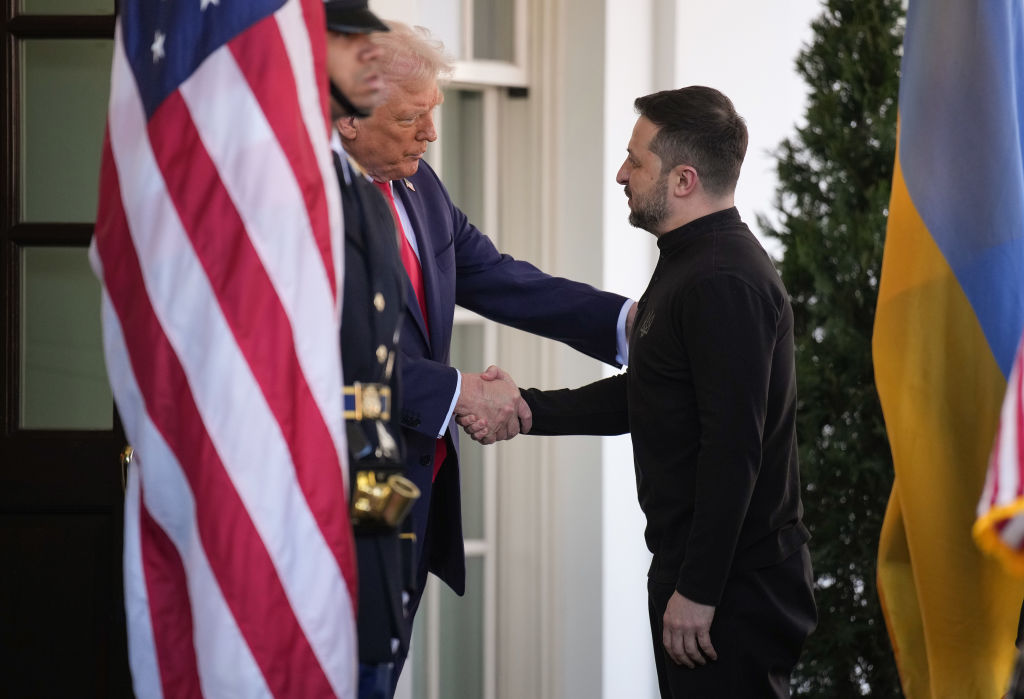
On the campaign trail in 2024, President Donald Trump vowed—at least 53 times, according to a CNN analysis—to end the war in Ukraine before or immediately upon retaking office. “I will settle the war in Ukraine before I even take office; I’ll settle it as president-elect. I met with President [Volodymyr] Zelensky the other day. I know President [Vladimir] Putin very well. I’ll get it settled,” he said in October.
Fast forward to today, and the prediction has not aged well. Grinding battles along the frontlines and deadly Russian aerial attacks on Ukrainian civilian centers continue apace. But on Wednesday evening, the president did achieve one of his goals: securing a critical minerals deal with Kyiv. In exchange for access to the war-torn country’s rare earth minerals, the U.S. will establish a jointly managed investment fund in Ukraine.
“This agreement signals clearly to Russia that the Trump Administration is committed to a peace process centered on a free, sovereign, and prosperous Ukraine over the long term,” Treasury Secretary Scott Bessent said in a statement. “And to be clear, no state or person who financed or supplied the Russian war machine will be allowed to benefit from the reconstruction of Ukraine.”
For Republican lawmakers who had been hoping the U.S. would adopt a tougher posture toward Russia, the deal could hint at a broader shift in the Trump administration’s peacemaking strategy, which up to this point has largely—and fruitlessly—centered on pressuring Ukraine rather than punishing the aggressor state. After shutting Kyiv out of initial peace talks, the White House invited Ukrainian President Volodymyr Zelensky to Washington, D.C., in February for an ill-fated Oval Office meeting with Trump. And last month, the president accused Zelensky of disrupting the path to a ceasefire, describing Russian President Vladimir Putin as “easier to deal with” than the Ukrainian leader.
But a deadly strike on Kyiv may have marked a turning point. A week ago today—and just hours after Trump’s praise of the Russian dictator—Moscow launched its deadliest attack on the Ukrainian capital since July, killing at least 12 people and injuring around 90. “I am not happy with the Russian strikes on KYIV. Not necessary, and very bad timing,” Trump wrote on Truth Social. “Vladimir, STOP! 5000 soldiers a week are dying. Lets [sic] get the Peace Deal DONE!”
Then, on Saturday, Trump and Zelensky spoke one-on-one in St. Peter’s Basilica, where world leaders had gathered to attend the funeral of Pope Francis. During the conversation, the U.S. president reportedly pushed Zelensky to ink a minerals deal as soon as possible, while the Ukrainian leader pushed for a tougher American posture toward the Kremlin. And the message seemed to have gotten through. In a Truth Social post following the sit-down, Trump accused Putin of needlessly targeting civilians and threatened Russia with new secondary sanctions.
The abrupt change in tone was music to the ears of hawkish Republicans in Congress. Asked if Trump is taking a new posture toward Putin, Sen. Mike Rounds of South Dakota, replied, “I hope so.”
“When you have an adversary like Mr. Putin, you have to trust and verify,” he told TMD. “But when the trust is not there, the verification proves it. Clearly, the trust should not be there now either. And I think most of us have already felt that way. I’m hoping that the president continues to find out just exactly how dangerous it would be to trust Mr. Putin without clearly being able to verify his plans.”
In early April, a bipartisan group of 50 senators led by Republican Sen. Lindsey Graham of South Carolina and Democratic Sen. Richard Blumenthal of Connecticut proposed a slew of primary and secondary sanctions on Russia. Their legislation would require the president to levy the penalties—which include a 500 percent tariff on goods from countries that purchase Russian oil, gas, or uranium—should he determine that the country had done such things including refusing to negotiate a peace with Ukraine or violating a peace deal.
“I hope that between what he’s saying and what he’s been advised on, that he recognizes Putin for the disingenuous liar that he is,” said Sen. Thom Tillis of North Carolina, who signed onto the sanctions effort.
“He’s doing it in plain sight, like, the attacks, and then he does a unilateral three-day ceasefire so he wouldn’t be distracted during his parades,” he added of Putin’s preemptive declaration of a temporary truce from May 8 to May 11, coinciding with a celebration of Russia’s victory over Nazi Germany in World War II. “It’s like, please, people, this guy’s a murderer, straight up.”
Meanwhile, Sen. John Kennedy of Louisiana made a case against Putin that appeared to play to Trump’s pride. “I think he thinks we’re afraid of him,” he said of Putin on Fox News over the weekend. “He has jacked around President Trump at every turn. He has disrespected our president. I don’t think it’s gonna get any better until we make it clear to Mr. Putin that we are willing to turn him and his country into fish food.”
Speaking to TMD on Wednesday, he reiterated his call for a hardline approach to Moscow. “I want us to settle the Ukraine War. I want it to be an honorable peace. And by that I mean a peace that deters Putin and other authoritarians from ever doing it again—a peace that rewards the courage of the people of Ukraine,” he said. “And I think to achieve that peace, particularly when you’re dealing with a pirate like Putin, you have to apply equal pressure to both sides.”
“I think most fair-minded Americans look at this and see the president—who is trying to reach a settlement—has applied more pressure to Ukraine than he has to Putin,” he added. “It’s time to apply the pressure to Putin.”
Today’s Must-Read

HHS Releases Landmark Review on Youth Gender Medicine
Toeing the Company Line
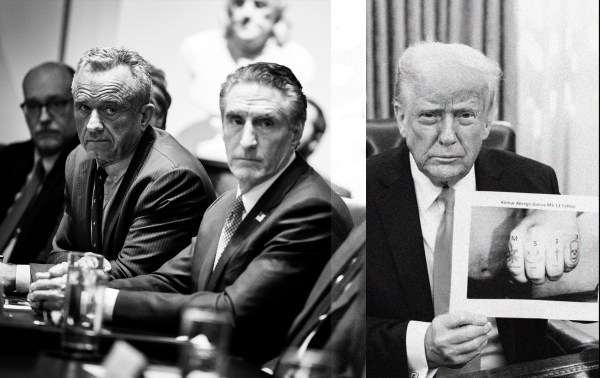

Busting ‘Manufacturing Jobs’ Myths
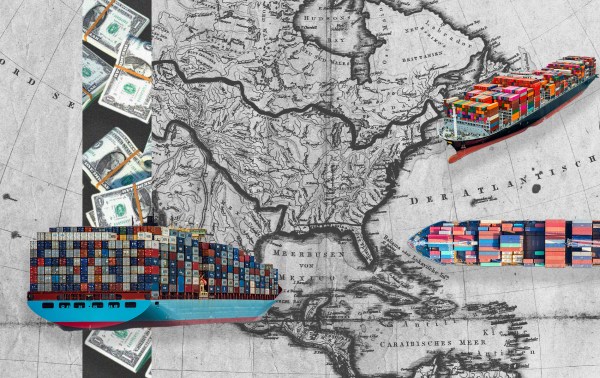
‘We’re Just Hoping the Ship Sinks’
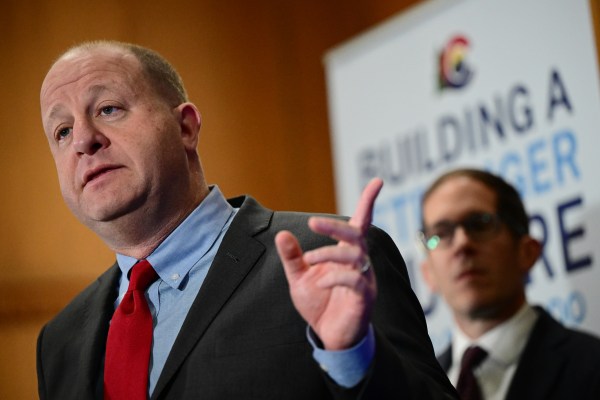
New Colorado Law Shows Democrats Haven’t Shifted on Gun Policy
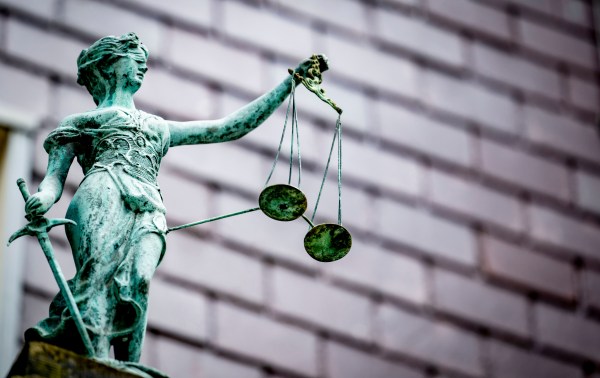
Defending the Citadel
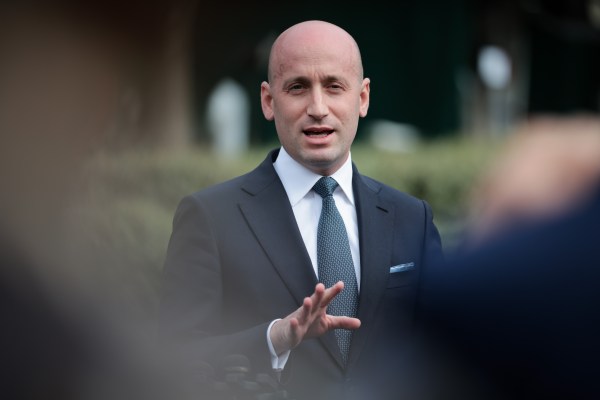
No, a Judge Is Not Preventing Trump From Enforcing Election Law

Are Religious Charter Schools Legal?
Worth Your Time
- The Atlantic’s Derek Thompson wrote about what could be the first sign that AI is competing with humans for jobs: the slumping job market for recent college graduates. “According to the New York Federal Reserve, labor conditions for recent college graduates have ‘deteriorated noticeably’ in the past few months, and the unemployment rate now stands at an unusually high 5.8 percent. Even newly minted M.B.A.s from elite programs are struggling to find work. Meanwhile, law-school applications are surging—an ominous echo of when young people used graduate school to bunker down during the great financial crisis,” he wrote. The “relatively weak labor market for college grads could be an early sign that artificial intelligence is starting to transform the economy. ‘When you think from first principles about what generative AI can do, and what jobs it can replace, it’s the kind of things that young college grads have done’ in white-collar firms, [Harvard economist David] Deming told me. ‘They read and synthesize information and data. They produce reports and presentations.’”
- For his Chartbook newsletter, economist Adam Tooze used maps and charts to break down Canada’s structural economic problems in light of the country’s recent election. “When you get to the economic data the upshot is even more surprising. According to statistics from [the Royal Bank of Canada], the volume of Canadian trade with the US is larger than the combined volume of intra-provincial trade within Canada. By this measure, the provinces that make up Canada as a federation are more integrated on the North-South axis with their Southern neighbor, the United States, than they are on the East-West axis between each other. Important context, when you consider the challenge to Canadian sovereignty posed by Donald Trump,” he wrote. “Remove the boundary demarcations and the national labels from this map and you would ‘see’ a sprawling mass of population inland from the East Coast that you might label ‘the USA.’ You would see another massive concentration further to the South that you might label ‘Mexico.’ But you would be hard-pressed to identify a separate entity to call ‘Canada.’”
Presented Without Comment
Bloomberg: Trump Says He Deserves a ‘Pass,’ as Data Shows First-Quarter GDP Contracted
In the Zeitgeist
Facing off against the Boston Red Sox on Tuesday night, Toronto Blue Jays outfielder Daulton Varsho made a catch that made us stand up and holler.
Let Us Know
Do you think the administration could be shifting gears in its approach to ending the Russia-Ukraine war?



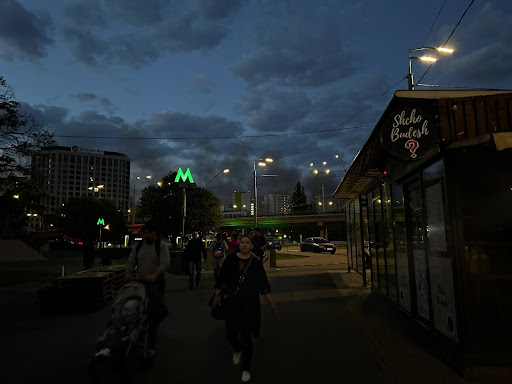
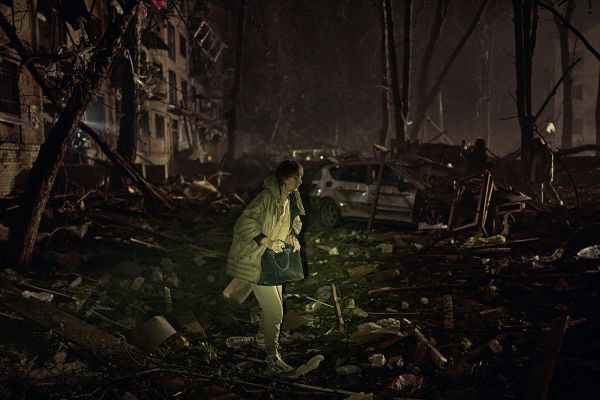
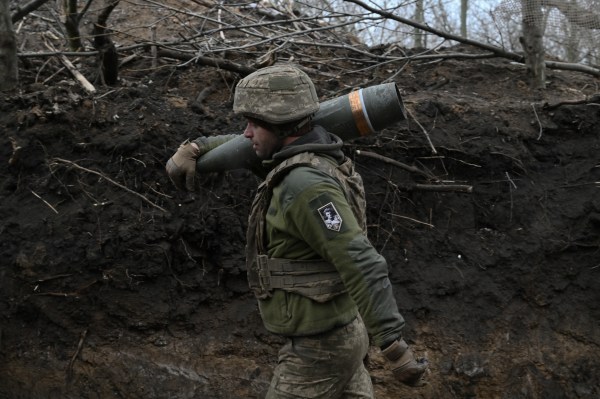

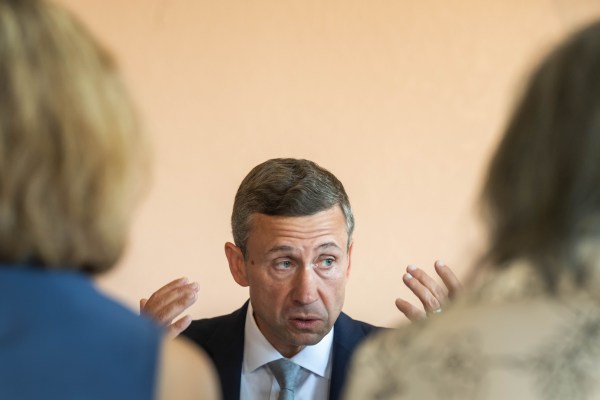
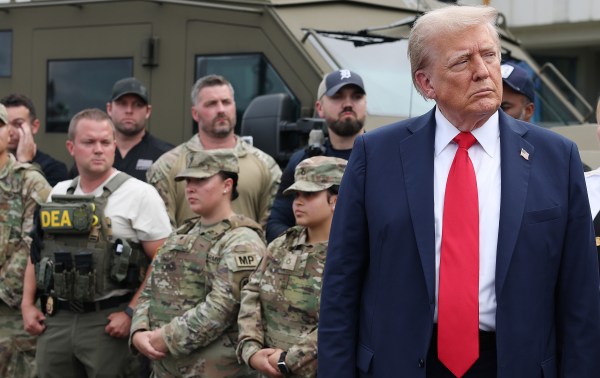


Please note that we at The Dispatch hold ourselves, our work, and our commenters to a higher standard than other places on the internet. We welcome comments that foster genuine debate or discussion—including comments critical of us or our work—but responses that include ad hominem attacks on fellow Dispatch members or are intended to stoke fear and anger may be moderated.
With your membership, you only have the ability to comment on The Morning Dispatch articles. Consider upgrading to join the conversation everywhere.